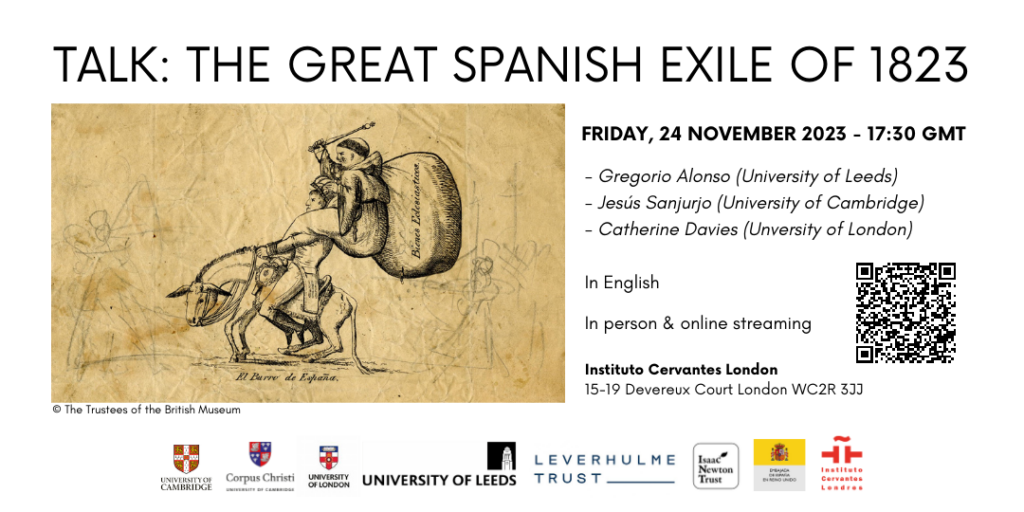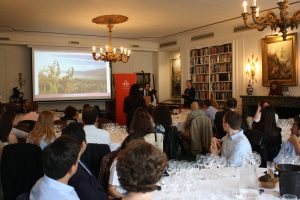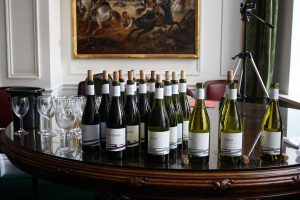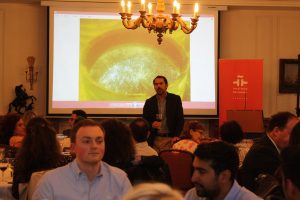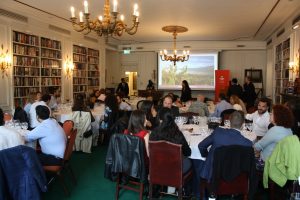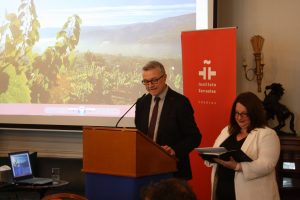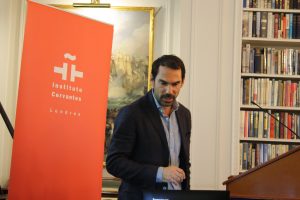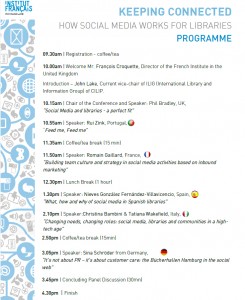Instituto Cervantes London hosts historical talk titled ‘The Great Spanish Exile of 1823’
Instituto Cervantes London welcomes Dr Gregorio Alonso (University of Leeds), Dr Jesús Sanjurjo (University of Cambridge) and Professor Catherine Davies (University of London) to explore a period of history not often discussed in a talk titled ‘The Great Spanish Exile of 1823’ on Friday, 24 November at 5:30pm.
The three academics will discuss this important event in Spanish history, which marked a period of political upheaval and forced departure of many liberal and progressive Spaniards, either by choice or to avoid political persecution.
This in-person and online activity is co-hosted by the Spanish Embassy to the United Kingdom and Instituto Cervantes London. «Since its creation, Instituto Cervantes London has been emphasising how the Hispanic presence in London adds value and contributes to the city’s cultural richness and diversity. Examples of this are the Cervantes Routes, specifically the ‘Routes of the Spanish exiles in London’ itineraries. On this occasion, three experts will tell the stories of the hundreds of Spaniards who were taken in and found protection,” says Víctor Ugarte, Director of Instituto Cervantes London.
Liberal exodus to London
After close collaboration between Great Britain and the Spanish authorities from 1808, the French occupation decreed by the Holy Alliance destroyed the liberal experience in September 1823. As a result, at least 1,000 Spanish families sought refuge in London.
Most of them lived in the London suburb of Somers Town, in the Euston-St Pancras area, where a tight-knit community quickly formed. The majority of the refugees were military officers, but noted intellectuals, politicians and skilled workers were also among them. Many were highly educated and put their minds to writing, translating and publishing to make a living.
Some of the most prominent liberal politicians and essayists of the time actively participated in a wave of new intellectual activity catalysed by London’s vibrant political and cultural life. Furthermore, London became a central hub for Spanish-speaking intellectuals from Spain and the Americas during this time.
Forced emigrations for ethnic and political reasons
Throughout history, Spain has witnessed various forced emigrations for ethnic and political reasons, such as the expulsion of Jews and Muslims who refused to convert to Christianity and the exile of more than half a million citizens in 1939.
«This was the case for more than 1,000 individuals who found refuge in London in 1823, following the restoration of the absolutist regime under Ferdinand VII. This episode has received some academic attention, but much remains unknown,» explains Jesús Sanjurjo, Early Career Fellow of the Leverhulme and Isaac Newton Trusts at the University of Cambridge and Corpus Christi College.
Spain became a focal point for British politics following the intervention of its armies in the war against Napoleon a few years earlier. Similarly, Britain had been regarded from Spain with a mixture of admiration, disdain and envy for some time, adds Sanjurjo.
“This is partly because the early industrialisation success of the British Isles was giving new impetus to their economy and international reputation. In 1823, London was competing on equal footing with Paris in its race to become the great metropolis of the West,” notes Dr Gregorio Alonso, Associate Professor in Hispanic History at the University of Leeds.
The city’s capacity to welcome and the material support it provided to political refugees was extended not only to the Spanish liberals fleeing Ferdinand’s repression, but also to the Greeks, Neapolitans, Prussians and Frenchmen who sought refuge in the British capital.
“This event will describe the men and women who found in London the protection and refuge that their homeland denied them and will also reflect on the difficulties they faced and the links they established with the people of London,” underlines Catherine Davies, Emerita Professor of Hispanic and Latin American Studies at the School of Advanced Study at the University of London.
Attention will also be paid to their relationship with the so-called American insurgents, who tried to forge alliances with the British authorities to throw off the Spanish imperial yoke. Thus, the event will explore the means by which London became the capital of Hispanic liberalism in the 1820s.
Instituto Cervantes London hosts a debate on the differences and similarities between the English and EU legal systems
On the occasion of the Spanish presidency of the Council of the European Union, Instituto Cervantes London is hosting a debate in English at 4:00 pm on Friday, 13 October on the differences and similarities between the English and European Union legal systems titled ‘English Law and EU Law: Still Two Separate Worlds?’.
The keynote speaker for the debate is Dr John Sorabji, Associate Professor at University College London (UCL) and Barrister at Nine St John Street Chambers. “There are greater similarities between our different forms of civil procedure than might be thought at first. The debate is undoubtedly interesting at the present time as we are all, to varying degrees, reforming our civil procedural systems due to digitisation, but also due to the UK’s departure from the European Union and the effects that will have over time,” explains Sorabji.
“While there are many areas where similarities and differences could be highlighted, particularly important ones in terms of similarities are the aims and objectives of all our systems, the focus on court management of proceedings and a distinction between first and second instance courts, while important differences include the approaches we take to obtaining evidence, the manner in which hearings take place and the role of the judge,” Sorabji adds.
A debate in the traditional home of the world of English law
The event at Instituto Cervantes London in Temple, the traditional home of the world of English law, is chaired by Bénédicte Paviot, the UK Correspondent for FRANCE 24 and Chair of the UK Advisory Board of Reporters Without Borders (RSF).
“Instituto Cervantes London is located among law firms in the heart of London and just a few metres from the Royal Courts of Justice. With this event, we hope to establish a closer relationship with our neighbours and for them to learn more about us on an occasion as special as the Spanish presidency of the Council of the European Union. Their response, especially that of The Law Society of England and Wales, has been fantastic, and bookings to attend sold out within hours, although the debate can still be followed online,” explains Víctor Ugarte, Director of Instituto Cervantes London.
“I think many will be surprised to see the similarities and differences between the EU and English-Welsh legal systems because there is still much common ground. Another topic of great interest that will be discussed during the debate is the validity of parts of EU law, or the so-called ‘retained EU law’,” Ugarte adds.
The afternoon programme includes welcome remarks by Ugarte, followed by a presentation by Jordi Nieva, the Chair of Procedural Law at the University of Barcelona, titled ‘Judicial Proceedings in Common and Civil Law: Searching for Common Bases’.
Nieva underlines that court cases in the UK are not so different in substance, even if outwardly they appear so, as they share the same historical origins. “It must be acknowledged that the civil law and common law procedural systems have been moving closer together for a long time. They may eventually converge completely in the future, and it is good to be aware of this,” he highlights.
Lluís Carreras, Professor of Procedural Law and Spanish lawyer, will give the talk ‘Bridging the Gap Between Common and Civil Law: An Expert Witness in Spanish Law before UK Courts’. “My experience as an expert witness has demonstrated that, in practice, when a British judge must apply a rule from the continental legal system, it is entirely possible to align the ‘legal minds’ and the application of ‘legal principles’ of both systems, thereby effectively contributing to the pursuit of justice in the specific case,” Carreras says.
Estelle Cros, Liaison Judge at the Embassy of France to the United Kingdom, will discuss ‘Retained EU Law and the Heritage of EU Law in the British Judiciary: A New Hybrid Law?’. To end, closing remarks will be provided by Oliver Chapman, International Policy Adviser for Europe and the CIS region at The Law Society of England and Wales.
Estelle Cros, Liaison Judge at the Embassy of France to the United Kingdom, will discuss ‘Retained EU Law and the Heritage of EU Law in the British Judiciary: A New Hybrid Law?’. To end, closing remarks will be provided by Oliver Chapman, International Policy Adviser for Europe and the CIS region at The Law Society of England and Wales.
Event details:
Friday, 13 Oct 2023 16:00 – 18:00 h.
Instituto Cervantes London | 15-19 Devereux Court | London WC2R 3JJ
El Instituto Cervantes de Londres acoge un debate sobre las diferencias y similitudes entre el sistema jurídico inglés y el de la UE
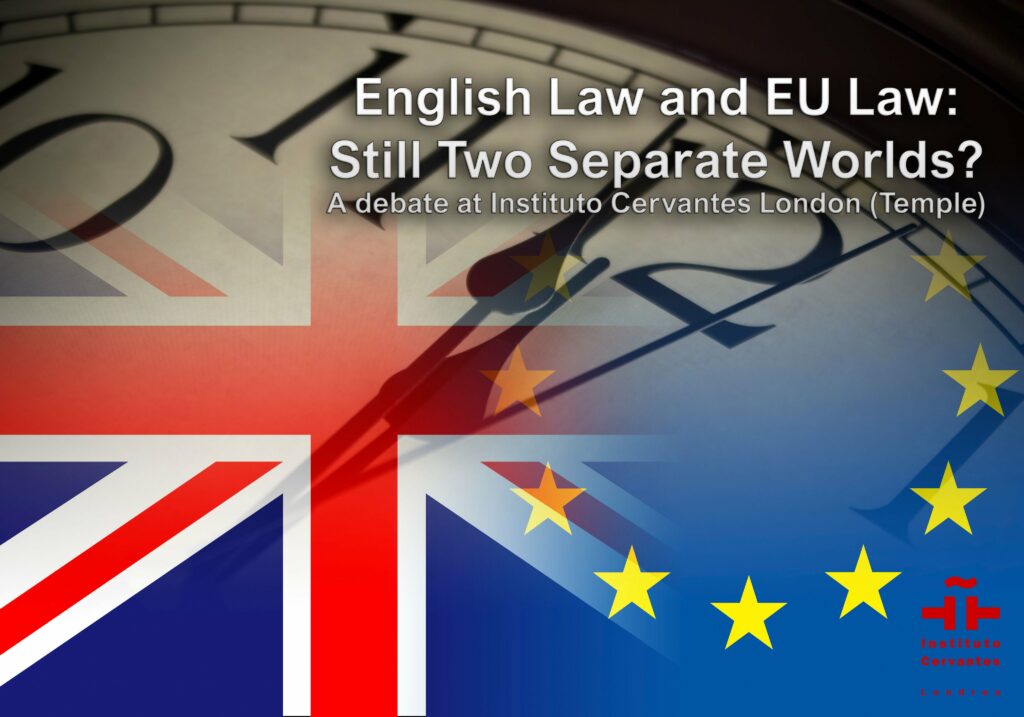
Con motivo de la Presidencia española del Consejo de la Unión Europea, el Instituto Cervantes de Londres acoge el viernes 13 de octubre, a las 16:00 horas, un debate en inglés sobre las diferencias y similitudes entre el sistema jurídico inglés y el de la Unión Europea: «Derecho inglés y de la UE: ¿Siguen siendo dos mundos separados?».
El ponente principal del debate es John Sorabji, profesor del University College London (UCL) y barrister en Nine St John Street Chambers. «Hay más similitudes entre nuestras diferentes formas de procedimiento civil de lo que podría pensarse a primera vista. El debate es, sin duda, interesante en la actualidad, ya que todos estamos, en mayor o menor medida, reformando nuestros sistemas procesales civiles debido a la digitalización, pero también a la salida del Reino Unido de la UE y a los efectos que tendrá con el tiempo», explica Sorabji.
«Aunque hay muchos aspectos en los que podrían destacarse las similitudes y las diferencias, entre las similitudes especialmente importantes se encuentran los fines y objetivos de todos nuestros sistemas, la atención prestada a la gestión judicial de los procedimientos, la distinción entre tribunales de primera y segunda instancia y, en cuanto a las diferencias, los enfoques que adoptamos para la obtención de pruebas, en la forma en que se celebran las vistas y el papel del juez», afirma Sorabji.
Un debate en la sede histórica del Derecho inglés
El acto en el Instituto Cervantes de Londres en Temple, sede histórica del mundo del Derecho inglés, estará dirigido por la corresponsal en el Reino Unido de FRANCE 24 y Presidenta del Consejo Asesor en el Reino Unido de Reporteros sin Fronteras (RSF), Bénédicte Paviot.
“El Instituto Cervantes de Londres está ubicado en el corazón del Londres de los despachos legales y a pocos metros de los Reales Tribunales de Justicia con quienes queríamos entablar una relación de vecindad y que nos conozcan en una ocasión tan especial como la Presidencia española del Consejo de la UE”, explica el director del Instituto Cervantes de Londres, Víctor Ugarte.
“Su respuesta, en especial la de The Law Society of England and Wales (asociación profesional que representa a los abogados en la jurisdicción de Inglaterra y Gales), ha sido fantástica y las reservas para asistir se agotaron en horas, si bien el debate podrá ser también seguido en línea. Creo que muchos se llevarán sorpresas al ver las similitudes y diferencias de los sistemas legales de la Unión Europea y el inglés-galés pues todavía hay muchos puntos en común. Otro tema de gran interés que se tratará en este debate es la vigencia de parte del derecho de la UE, la llamada Retained EU Law”, añade Ugarte.
El programa del viernes, 13 de octubre, incluye unas palabras de bienvenida del propio Ugarte, seguidas de una ponencia del catedrático de Derecho Procesal de la Universidad de Barcelona, Jordi Nieva, sobre ‘El proceso judicial en el Sistema de Derecho anglosajón y en el continental: En busca de bases comunes’.
Jordi Nieva subraya que los procesos judiciales en el Reino Unido no son tan diferentes en el fondo, aunque externamente lo parezcan, ya que provienen exactamente del mismo origen histórico: “Es preciso reconocer que los sistemas procesales del sistema de Derecho anglosajón y en el Derecho continental hace tiempo que se están aproximando muchísimo. Pueden acabar convergiendo completamente en el futuro, y es bueno ser conscientes de ello”.
El profesor de Derecho Procesal y abogado español, Lluís Carreras, hablará sobre ‘Cómo salvar la brecha entre el Derecho anglosajón y en el continental: Un experto en Derecho español ante los tribunales británicos’. «Mi experiencia como perito me ha demostrado que, en la práctica, cuando un juez británico debe aplicar una norma del sistema jurídico continental, es perfectamente posible alinear las «mentes jurídicas» y la aplicación de los «principios jurídicos» de ambos sistemas, contribuyendo así eficazmente a la búsqueda de la justicia en el caso concreto», añade Carreras.
Por su parte, la intervención de la jueza de enlace de la Embajada de Francia en el Reino Unido, Estelle Cros, tratará sobre ‘El Retained EU Law y el Legado del Derecho de la Unión Europea en la Judicatura Británica: ¿Un nuevo Derecho híbrido?’. La clausura correrá a cargo de Oliver Chapman, asesor de política internacional para Europa y la región de la Comunidad de Estados Independientes (CEI, por sus siglas en inglés) de la Law Society de Inglaterra y Gales.
El debate cuenta con el apoyo de la Embajada de España en el Reino Unido, la Embajada de Francia en el Reino Unido, la Delegación de la Unión Europea en el Reino Unido, la Law Society of England and Wales, la Cámara de Comercio de España en el Reino Unido y la British Spanish Law Association.
Detalles del evento
Viernes, 13 de octubre 2023 16:00 – 18:00 h.
Instituto Cervantes Londres | 15-19 Devereux Court | London WC2R 3JJ
International Seminar: The Education of a Christian Woman (1523) in the Construction of the Image of Female Power of Queen Mary I of England (1553-1558)
Arte, Poder y Género Research Group / MEFER Project / Instituto Cervantes London / British Spanish Society / University College London
Organisation: Emma Luisa Cahill Marrón.
Coordination: Laura Martínez Cayado.
Dates: 24-25 January 2023.
Format: Hybrid (In person/Zoom).
24 January: Instituto Cervantes (15-19 Devereux Ct, Temple, London) & 25 January: University College London (Common Ground, South Wing).
Registration: Free/Required. Please send an email to artepoderygenero@um.es
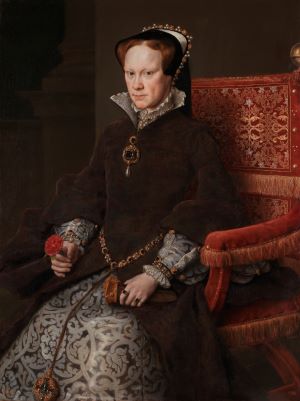
© Museo Nacional del Prado
This international seminar celebrates the 500-year anniversary of the first publication of The Education of a Christian Woman. It will focus on its patron, author, and dedicatee. It will address its impact on the construction of the image of female power in Tudor England. In 1523 De institutione feminae Christianae, the book’s first title, was published. The author was Spanish Humanist Juan Luis Vives (1493-1540) who at the time was also a Lecturer at Corpus Christi College in Oxford. The book was commissioned by his ‘only patron’, the Queen of England, Catherine of Spain, commonly known as Catherine of Aragon (1485-1536). It was written in Latin, the language of the New Learning movement it belongs to, and it focused on the three stages in which Vives divided a woman’s life: as a maiden, as a married woman and a matron, and as a widow. It was dedicated to Princess Mary Tudor future Queen Mary I (1516-1558). It was part
of a wider curriculum that Queen Catherine designed for her daughter’s formal training as first ‘heiress apparent’ to receive a formal Renaissance education in England. The book was an instant success throughout Europe with many reprints, and it became the most influential work of its kind in the Modern Age. The Education of a Christian Woman had an impact in the way that Queen Mary I constructed her image of power as the first Queen Regnant in English history. Despite this, Queen Catherine’s role as intellectual and financial patron is often overlooked and the connections between the manual and Mary I’s trailblazing propaganda as the first woman to be educated to rule
have yet to be explored.
This international seminar will focus both on visual arts and documentary evidence that deal with this important void in queenship historiography. Leading specialists in several fields will address topics like the Christian education of the daughters of Queen Isabella of Castile and the ties between the Spanish alliance and the construction of the image of female power in Tudor portraiture. Other important subjects will speak to Queen Mary I’s use of female recourses present in Vives’ work in the representations of the monarch as Queen Regnant, as ‘Mother of England’, and as married woman and queen consort of King Philip of Habsburg (1527-1598). Other experts will talk about Mary I’s role as first woman to exercise power and how this was translated after her reign. Another crucial topic that will be discussed is the growing historiographical trend that is brining into the light Mary I’s outstanding contributions in female rulership in Renaissance Europe.
PROGRAMME
24 January
Location: Instituto Cervantes. 15-19 Devereux Ct, Temple, London
5.00 pm – 5.45 pm
Acto inauguraL – Víctor Ugarte, Instituto Cervantes London. José Pascual Marco, Ambassador of Spain to the United Kingdom. Alexander Samson, University College London. Noelia García Pérez, University of Murcia.
5.45 pm – 6.15pm
Las mujeres cristianas en los intercambios de retratos entre la Monarquía Hispánica y la dinastía Tudor – Emma Luisa Cahill Marrón, Independent Scholar.
6.15 pm – 7.00 pm
Mary I & the Art of Queenship – Peter Stiffell, University of Kent.
7.00 pm – 8.00 pm. Roundtable
Educating the Eye: Gender, Power, and Representation in the Visual Arts in the Reign of Mary I – Karen Hearn, University College London. Johanna Strong, University of Winchester. Aoife Stables, Independent Scholar. Patricia Manzano Rodríguez. Durham University. Irini Picolou, Durham University.
8.00 pm – 8.30 pm. Vino español
25 January
Location: Common Ground, South Wing, University College London
9.30 am – 10.15 am
Before Vives. The Christian Education of the Daughters of Queen Isabella of Castile – Melania Soler Moratón, University of Murcia / University of Valladolid.
10.15 am – 11.00 am
Juan Luis Vives’ ‘Patronae Unicae’: Queen Catherine of Aragon and the Construction of the Image of Female Power in Tudor England – Emma Luisa Cahill Marrón, Independent scholar.
11.00 am – 11.45 am
Early Modern Women and the Archive – Alexander Samson, University College London.
11.45 pm – 1.45 pm. Lunch
1.45 pm – 2.30 pm
The Continued Instruction of Christian Women: Reprints of Vives – Valerie Schutte, Independent Scholar.
2.30 pm – 3.15 pm
The Power of Networks and The Networks of Power: The Development and Cultivation of Female Friendship by Mary I, for both Personal Solace, and Political Capital – Melita Thomas. University College London.
3.15 pm – 3.30 pm. Coffee break
3.30 pm – 4.30 pm. Roundtable
‘The Education of a Christian Woman’ in the Context of Queenly Education – Elena Woodacre, University of Winchester.
Participants:
Alexander Samson, University College London. Valerie Schutte, Independent scholar.
Melita Thomas, University College London. Emma Luisa Cahill Marrón, Independent
scholar.
Mujer y Feminidad en los inicios de la Edad Moderna en España y el Nuevo Mundo – Empoderamiento, Autonomía y Autoría
Este coloquio se programó inicialmente para el 20 de marzo, pero tuvo que postponerse y ahora lo presentamos en formato podcast.
El objetivo es poner en valor el trabajo inspirador y las experiencias de las mujeres que, en la España de los inicios de la Edad Moderna y en el Nuevo Mundo, desafiaron las normas y tradiciones de su tiempo.
Mujeres que no han sido plenamente reconocidas y que, en el caso de las escritoras, tienen muy pocas obras traducidas al inglés.
El panel aborda, asimismo, cómo las mujeres del Siglo de Oro han sido representadas y recibidas sus piezas, tanto en el pasado como actualmente.
Este evento ha sido posible gracias a la colaboración entre el IMLR y el Instituto Cervantes de Londres.
Ponentes:
Elena Carrera (QMUL): ‘Women’s Shame in Early Modern Spain and Spanish America’.
Catherine Maguire (QMUL): ‘Representing mothers and maternal hope in sixteenth- and seventeenth-century Spanish shrine books”.
Ana Maria Rodríguez (University of Iowa): ‘Wise and valiant: Ana Caro and Golden Age female writers’.
Online Colloquium Women and Womanhood in Early Modern Spain and the New World – Agency, Autonomy and Authorship
This event was originally scheduled for 20 March 2020 but regrettably had to be postponed due to Covid-19.
This podcast has been recorded in its place and will showcase the inspiring work and experiences of women in early modern Spain and the New World who challenged the norms and traditions of their times.
These women have not been fully recognised and, in the case of the writers, very few of their works translated into English.
The panel also discusses how Golden Age women have been represented and their works received, in the past and today.
This event is held in collaboration with the IMLR and Instituto Cervantes in London.
Participants:
Elena Carrera (QMUL): ‘Women’s Shame in Early Modern Spain and Spanish America’.
Catherine Maguire (QMUL): ‘Representing mothers and maternal hope in sixteenth- and seventeenth-century Spanish shrine books”.
Ana Maria Rodríguez (University of Iowa): ‘Wise and valiant: Ana Caro and Golden Age female writers’.
The new Spanish wine, to conquer London
London hosted a wine tasting of Valdesil wineries organised by Institute Cervantes in London, by Juan Manuel Bellver, one of Spain’s best-known food and wine critics.
Bellver presented Spanish wine history through a map in which he commented the protected designation of origin throughout Spanish geography, regions of vineyards that are protected. «London in one of the European cities where wine of all kinds it is most appreciated and particularly the fortified, among which our Jerez has almost no rival», explained the general director of Lavinia Spain.
«To come here to talk about Spanish wine to such an interested audience, within the framework of a historic club like The Rag, has been an enriching and fascinating experience. The tasting allowed the attendees to enjoy in their glass the fascinating history of unknown wineries, centuries-old vines, steep slopes and dreamer vineyards that I had previously told them,” Bellver said.
Institute Cervantes in London organised the tasting in collaboration with the Spanish Wine Federation. It took place in the prestigious private club of The Rag-the Army and Navy, founded in 1837, located in St James: the heart of the capital. Originally for military and naval officers, it now welcomes everyone.
Six wines were tasted; four whites and two reds. All are currently for sale in the United Kingdom – Valdesil Sobre Lías 2018 (white wine, godello grape), Valdesil Sobre Lías 2013 (white wine, godello grape), Pezas da Portela 2016 (white wine, godello grape), O Chao 2016 (white wine, godello grape), Valderroa 2016 (red wine, mencía grape) and Valderroa Carballo 2015 (red wine, mencía grape).
This was the first of a series of lectures and wine tastings organised by the Cervantes Institute in London, which featured the first encounter with wines from the northwest of Spain, specifically from Valdeorras, in Galicia.
Borja Prada is the technical director of Valdesil and seventh generation of a family dedicated to wine. He explained how the British market was the first export for Bodegas Valdesil, starting the commercialisation of wines in 1993.
«For Valdesil the British market has been a great challenge, because it is the most demanding market in the world, but also a great satisfaction, because it confirms that the wines made by Valdesil are world class, and that they compete with the best,» says Prada.
In addition, the winemaker adds how the British market has also been «a source of joy”. This is due to the quality of the wines, which have been praised by British critics, and reviewed in publications such as: The Guardian, The Daily Telegraph, and also on the BBC, «Saturday Kitchen Live» programme.
El nuevo vino español, a la conquista de Londres
Londres acogió una cata de vinos de las bodegas Valdesil organizada por el Instituto Cervantes de Londres, a cargo de Juan Manuel Bellver, uno de los críticos gastronómicos y de vinos más conocidos de España.
Bellver presentó la historia vinícola española a través de un mapa en la quecomentó las denominaciones de origen de la geografía española. “Londres en una de las ciudades europeas donde más se aprecia el vino de todas las clases y particularmente los fortificados, entre los cuales nuestro Jerez casi no tiene rival”, explicó el director general de Lavinia España.
“Venir aquí a hablar de vino español ante un auditorio tan interesado, en el marco de un club histórico como The Rag, ha sido una experiencia enriquecedora y fascinante. La cata permitió a los asistentes disfrutar en su copa de esa historia fascinante de comarcas vinícolas ignotas, cepas centenarias, laderas escarpadas y viñadores soñadores que yo les había contado previamente”, destacó Bellver.
La cata organizada por el Instituto Cervantes de Londres en colaboración con la Federación Española del Vino, tuvo lugar en el prestigioso club privado de The Rag- the Army and Navy, fundado en 1837, originalmente para oficiales militares y navales, pero que ahora da la bienvenida a hombres y mujeres profesionales, tanto de origen militar como civil, y situado en St James, en el corazón de la capital británica.
Se cataron seis vinos, cuatro blancos y dos tintos, que están actualmente a la venta en el Reino Unido:Valdesil Sobre Lías 2018 (vino blanco, uva godello), Valdesil Sobre Lías 2013 (vino blanco, uva godello), Pezas da Portela 2016 (vino blanco, uva godello),O Chao 2016 (vino blanco, uva godello), Valderroa 2016 (vino tinto, uva mencía) y Valderroa Carballo 2015 (vino tinto, uva mencía).
Esta fue la primera de una serie de charlas y catas de vinos que organizará el Instituto Cervantes de Londres, que contó en el primer encuentro con vinos del noroeste de España, en concreto de Valdeorras, en Galicia.
Borja Prada, director técnico de Valdesil y miembro de la séptima generación familiar dedicada al vino explicó cómo el mercado británico fue el primero de exportación para Bodegas Valdesil, iniciando la comercialización de los vinos en 1993.
“Para Valdesil el mercado británico ha supuesto un gran reto, pues es el mercado más exigente del mundo, pero también una gran satisfacción, pues confirma que los vinos que elabora Valdesil son de clase mundial, y que compiten con los mejores”, comenta Prada.
Además, el enólogo reconoce como el mercado británico ha sido también “una fuente de alegría”, ya que la calidad de los vinos ha sido elogiada por los críticos británicos, y los vinos han sido reseñados en medios de comunicación como «The Guardian», «The Daily Telegraph», «Financial Times», «The Daily Mirror», y también en la BBC, en el programa «Saturday Kitchen Live”.
Conferencia inaugural de «Quijotes por el mundo» / Don Quixotes Around The World Opening Lecture
El ministro de España en el Reino Unido, Federico Trillo, la directora de Cultura del Instituto Cervantes, Beatriz Hernanz, el comisionado de la exposición «Quijotes por el mundo», el cervantista y catedrático José Manuel Lucía Megías, y el más conocido traductor contemporáneo del Quijote de Cervantes al inglés, John Rutherford, han inaugurado la exposición «Quijotes por el mundo» compartiendo su experiencia personal con el mundo de Don Quijote de la Mancha y analizando la aportación de Cervantes a la literatura mundial a través de su obra maestra.
«Quijotes por el mundo» es un tributo a Miguel de Cervantes en el IV centenario de su muerte y un reconocimiento a todos los traductores que han contribuido a que, con 172 variantes dialectales de 147 lenguas distintas, «El ingenioso hidalgo don Quijote de la Mancha» sea la obra más traducida del mundo después de la Biblia.
_________________________________________________________________
_________________________________________________________________
Spanish Ambassador in the United Kingdom Federico Trillo, the Head of Culture of the Instituto Cervantes Beatriz Hernanz, the comissioner of the Don Quixote Around The World exhibition Jose Manuel Lucia Megias, and the most well-known contemporary translator of Don Quixote into English Prof. John Rutherford, opened the Don Quixotes Around The World exhibition to the public by sharing their personal experiences with Don Quixote and commenting on Cervantes’s contribution to worldwide literature through it.
Quixotes Around The World is a tribute to Miguel de Cervantes on the IV centenary of his death and a global recognition of all the translators who, having translated Cervantes’s masterpiece into 147 different languages and 172 dialectal variations thereof, have contributed to turning The Ingenious Gentleman Don Quixote Of La Mancha into the second most translated book in the world after the Bible.
Seminario EUROLIS: El rol de las redes sociales en las bibliotecas / EUROLIS Seminar: How Social Media Works For Libraries
EUROLIS y el International Group of Cilip organizan el seminario KEEPING CONNECTED: HOW SOCIAL MEDIA WORKS FOR LIBRARIES
>>>
Durante la jornada se analizará en detalle cómo las bibliotecas europeas utilizan las redes sociales para gestionar sus relaciones públicas y atraer a nuevos usuarios.
Todos los ponentes trabajan con el objeto del seminario en su día a día, y aportarán valiosos puntos de vista:
+ Rui Zink | Portugal
Escritor de ficción. Profesor de redacción y edición en Universidade Nova de Lisboa (Lisboa)
+ Romain Gaillard | Francia
Responsable de la librería Canopée en París. Profesor de redes sociales y estrategia digital para bibliotecarios
+ Phil Bradley | Reino Unido
Bibliotecario, asesor en internet, formador acreditado del Parlamento Europeo y antiguo presidente del Chartered Institute of Library and Information Professionals (CILIP)
+ Sina Schröder | Alemania
Responsable de redes sociales en Bücherhallen, en Hamburgo
+ Christina Bambini & Tatiana Wakefield | Italia
Bibliotecarias en la biblioteca pública San Giorgio en Pistoia (Toscana). Autores de “La biblioteca diventa social» (La biblioteca se socializa)
+ Nieves González Fernández-Villavicencio | España
Bibliotecaria académica en la Universidad de Sevilla. Profesora de Biblioteconomía
Fecha y lugar:
Viernes 27 de noviembre 2015
9.30 – 16:30
Instituto Francés – 17 Queensberry Place, London SW7 2DT (tube station: South Kensington)
£60 (concesiones £50), comida incluida
Programa (haz clic para ampliar):
Más información y entradas: institut-francais.org.uk > Eurolis y eurolis.wordpress.com
Organización: library@institutfrancais.org.uk
______________________________________
EUROLIS & the International Group of Cilip are hosting the seminar KEEPING CONNECTED: HOW SOCIAL MEDIA WORKS FOR LIBRARIES
>>>
The seminar will take a deeper look at how librarians across Europe use social media to manage public relations and attract new users.
All speakers are actively involved in the matter discussed at the seminar and will provide valuable insight:
+ Rui Zink | Portugal
Fiction writer & professor of Editing and Writing at Universidade Nova de Lisboa (Lisbon)
+ Romain Gaillard | France
Head of « Canopée » Library (Paris) & teaches social media & digital strategies for librarians
+ Phil Bradley | UK
Librarian, internet consultant, accredited trainer for the European Parliament and former President of the Chartered Institute of Library and Information Professionals (CILIP)
+ Sina Schröder | Germany
Social Media manager at Bücherhallen Hamburg
+ Christina Bambini & Tatiana Wakefield | Italy
Public librarians at San Giorgio Public Library in Pistoia (Tuscany). Authors of “La biblioteca diventa social (The Library Becomes Social)“
+ Nieves González Fernández-Villavicencio | Spain
Academic librarian at University of Seville. Lecturer in librarianship
Time and place:
Friday 27 November 2015
9.30am – 16:30
French Institute – 17 Queensberry Place, London SW7 2DT (tube station: South Kensington)
£60 (£50 concessions) including lunch
Programme (click to enlarge):
More info and tickets: institut-francais.org.uk > Eurolis and eurolis.wordpress.com
Organisers: library@institutfrancais.org.uk
